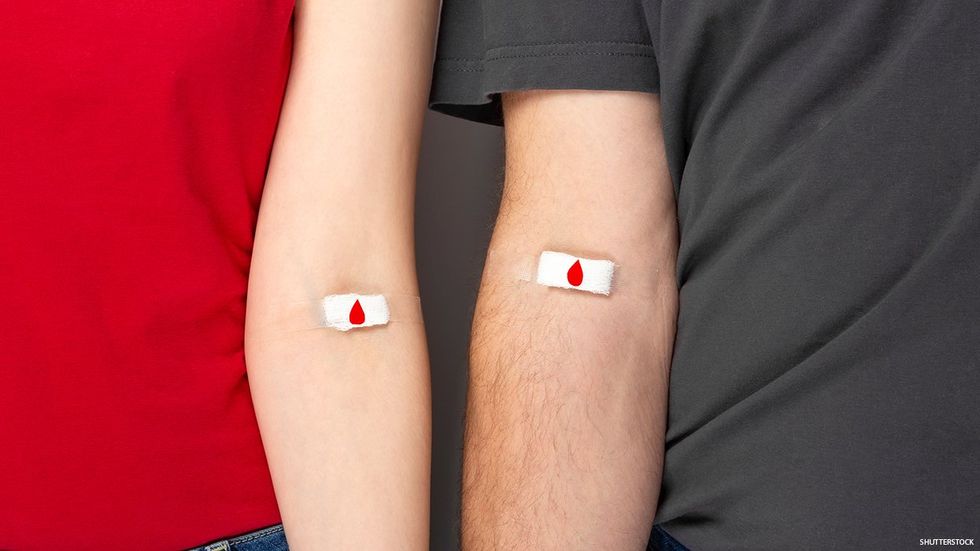As of Monday, new policies are in effect regarding who can donate blood. No longer will gay, bisexual, and other men who have sex with men be discriminated against for their sexual orientation after being banned, in some form, from participating in life-saving blood donation for nearly 40 years. Additionally, no attention is paid to whether somebody is transgender, intersex or gender-nonconforming.
Recently, The Advocate spoke with the Director of the Food and Drug Administration’s Center for Biologics Evaluation and Research, Dr. Peter Marks, to discuss the FDA’s new guidelines regarding blood donations in the United States.
Those new guidelines that previously excluded gay, bisexual, and other men who have sex with men no longer exclude people based on their sexual orientation or gender identity.
Instead, they focus on the level of risk certain behaviors pose, according to the FDA.
What was the blood ban, and why were gay, bisexual, and other men who have sex with men excluded from giving blood?
In 1985s, after falsely labeling HIV and AIDS “gay diseases,” the FDA banned lifetime blood donations for men who had sexual relations with another man since 1977. In addition, the FDA banned sex workers, people living with HIV, and intravenous drug users from donating blood. It was reduced to a one-year deferral period in 2015, and after the COVID-19 pandemic caused blood shortages in April 2020, it was reduced to three months of celibacy.
What are the new guidelines?
Effective August 7, 2023, potential blood donors will be screened using an updated questionnaire. No more gender-specific deferrals or screening questions about sex between men and women will be conducted. In adopting risk-based regulations, the United States will follow the United Kingdom and Canada.
Who can donate blood under the new policy?
Queer men in monogamous relationships can now give blood. All potential donors will be screened using a new questionnaire about that person's risks for HIV. That will include questions on their sexual behavior, recent sexual partners, and subjects.
Who can't donate blood under the new policy?
Potential donors who report having anal sex with new partners in the last three months won't be able to donate. Instead, they'll have to wait to donate blood.
Can I donate blood if I'm on PrEP or PEP?
Under the new regulations, people who take medications for PrEP or PEP are also not eligible to donate blood.
If every drop of blood in the blood supply is tested for pathogens, why are there still exclusions?
Dr. Peter Marks, Director of the Food and Drug Administration’s Center for Biologics Evaluation and Research, said that even though modern sensors are excellent at keeping the blood supply safe, screening is still necessary when collecting blood for donation.
Detecting HIV in people who have recently been infected is, however, a challenge for devices, he said.
“There is a period with our current testing, it’s about 10 days after infection, where our current tests are not able to tell whether someone has been infected,” said Marks. “It’s just they’re not sensitive enough to be able to pick up the virus. And because of that, we need to have an additional layer of safety on top of that by asking people whether they have done anything in that recent past that could put them at risk for having become infected.”
If people who take PrEP have to be HIV-negative to take the medication, and the medication prevents HIV transmission, why are people who use PrEP prohibited from donating blood?
As testing improves and more data and experience are gathered, the FDA may be able to reduce restrictions in the future.
“We really want people to keep taking their PrEP,” he says. PrEP does an extremely good job at making sure a person doesn’t acquire HIV through sex, he explained, because the amount of blood exchanged “is measured in fractions of teaspoons.”
The amount of blood required for blood transfusions is much more significant.
“The issue is that when you’re talking about something that’s a thousand times more in volume, that potentially means that if there’s a little virus there, it could come along,” he says. “The other problem that goes along with PrEP is that, because it keeps down replication of the virus, in that larger volume, there could be a small amount of the virus, and our current tests won’t be able to detect it.”
For now, deferment for those on PrEP is necessary to ensure that the blood supply remains safe as science develops better tests.
“We’re committed to keeping our policies as up-to-date as we can and science-driven so that we can [allow] as many people to donate as we can,” he said.
I’m gay or bisexual. Can I donate blood?
Yes. Being gay or bisexual or otherwise being a man who has sex with men does not limit donor eligibility. Donors are not asked about their sexual orientation.
I am transgender. Can I donate blood?
Yes. Being transgender does not limit donor eligibility. A donor can indicate the gender they identify with at the time of donation. They do not need to disclose that they are transgender.
I am intersex. Can I donate blood?
Yes. Being intersex is not an eligibility criterion for donors. During donation, donors can indicate the gender with which they identify. The FDA requires donation centers to allow donors to choose whether they are male or female. Staff do not need to be informed that individuals are intersex.
I am gender non-binary, gender non-conforming, genderqueer, gender fluid, or agender. Can I donate blood?
Yes. Gender identity and gender expression do not affect donor eligibility. According to FDA guidelines, all donors are required to answer the same questions. Currently, the FDA requires donation centers to allow donors to choose between male and female. Individuals do not need to inform staff of their gender identity.
Find out more here.















































































